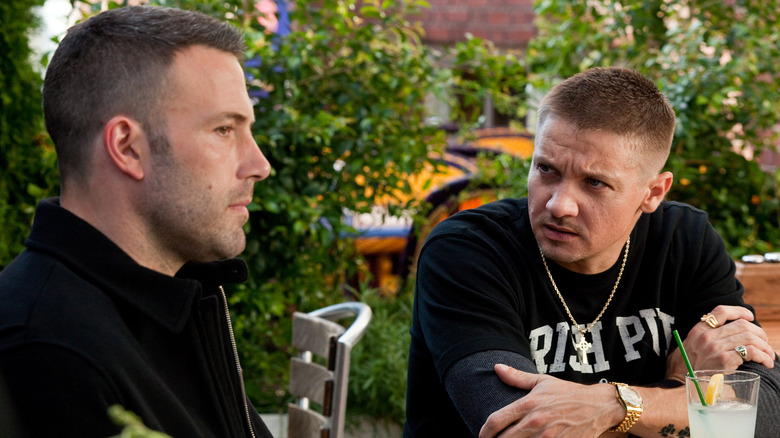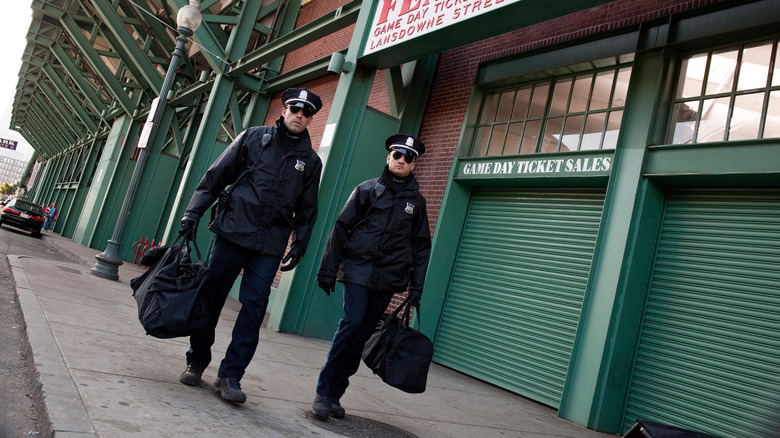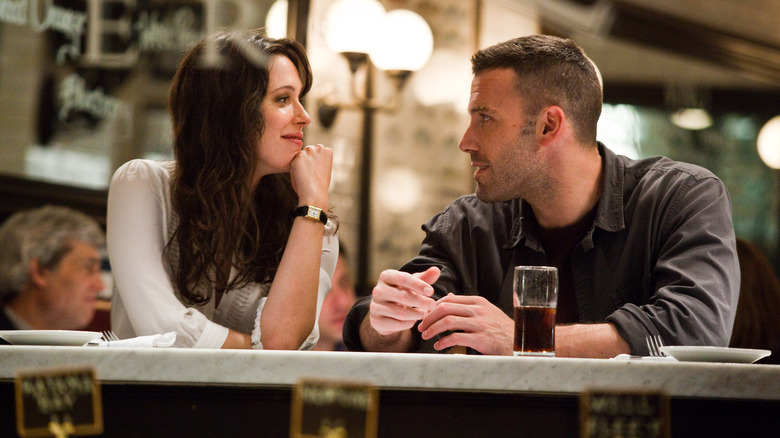The Town's Alternate Ending Offered A Fitting End For Ben Affleck's Doug
Ben Affleck has been having quite the career rejuvenation in front of the camera as of late, with admirable turns in acclaimed films like "The Last Duel," "The Way Back," and "The Tender Bar." But just because it's been a handful of years since he's stepped behind the camera, let us not forget that Affleck has established himself as quite the impressive director. His second feature effort was the 2010 heist flick "The Town," which also saw him playing the lead role of Doug MacRay, in addition to his duties as director and co-writer.
Time has been extremely kind to "The Town," and for my money, it ranks as one of the better heist movies of the last 20 years, maybe even an all time great. But the movie almost ended in a very different fashion, with Affleck's Doug nearly meeting an arguably more fitting fate than what ended up in the final cut.
No reward for the guilty
In the cut of "The Town" that made it to theaters, after the big heist at the end of the movie goes south and everyone else in Doug's crew is killed, he manages to get away with a big bag of cash. In getting ready to leave town, he makes a last-ditch effort to see if he can get away with Claire (Rebecca Hall). The idea that they could still run away together after everything that happened would be a delusional, happy ending. But Doug sees that the cops have already gotten to her and she very slyly tips Doug off on the phone. He makes his way out of town alone, but not before burying the cash in Claire's garden, figuring that she can do some good with it. We finish the film with a heartfelt letter from Doug as we see him living his life on peaceful banks by the water somewhere, a new man.
The alternate ending is far less forgiving to Doug and the wrongs he's committed while living a life of crime. Following the heist, bag of cash in hand and still in a cop uniform, Doug is confronted by Alex Colazzo just as he's getting to his getaway car. For those who may not remember, this is the guy he and James (Jeremy Renner) beat up in his apartment earlier in the movie as retribution for terrorizing Claire. Alex, it turns out, suffered longstanding injuries as a result of this confrontation between Doug and James. After a tense stand-off, Alex shoots Doug several times. Doug is left to die in the streets, not at the hands of the cops that were trying to prevent him from getting away, but from a minor character who Doug wronged earlier in the movie that the audience had likely forgotten about by now. But "The Town" always remembers.
Better than the original ending?
The idea of "better" is a very subjective thing when it comes to art, and movies are no exception. For me, as it relates to "The Town," a movie I very much love, I am of two minds about the whole thing. Divorced from the idea of movies overall, the alternate ending is absolutely a fitting end to Doug's journey. While he is the main character of this movie and, at times, a sympathetic character, he is not a good man. This is a criminal who has done lots of bad things that hurt people, both directly and indirectly. A life of crime, especially major ones, is bound to put one in the line of danger eventually. Ironically enough, James did time in prison for killing the man who was going to kill Doug years back. The second James is out of the picture, someone kills Doug. The alternate ending is sort of poetic in a messed up kind of way, when looking at it through that lens.
Yes, the alternate ending to Ben Affleck's sophomore directorial effort is far less "happy" but it seems to fit the world as we perceive it. Bad people get what they deserve. On the other hand, movies do not have to be a perfect representation of the world as it exists. What we experience through much of the film is that Doug is a man who mostly ended up in a life of crime as a victim of circumstance. His tragic upbringing, the son of a hardened criminal, almost being forced into it all by the powers that be even when he finds a compelling reason to get out of the life, all of that led Doug down this path. While Doug may be a criminal who has done some very bad things, he is not, altogether, a bad person. There is a good man inside of him somewhere.
The ending that we get offers a bit more of an optimistic view of life overall. People can change and even bad men can do things and, perhaps through a great deal of work and self-reflection, actually do some good in the world. Isn't that better than ending up dead in the street somewhere? Sure, the theatrical ending does put some rose-colored glasses on the whole thing but it is, in its own way, equally cinematic and perhaps more thematically resonant. Not that it matters all that much, but in my humble opinion I'm glad "The Town" ends the way that it ends, though the alternate ending isn't without merit.


